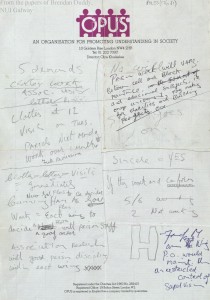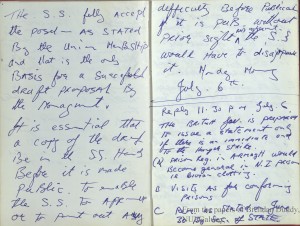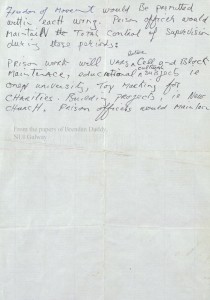Nov 23, 2011
“Rusty Nail”: The Smoking Gun
See also: Mountain Climber Notes + Timeline
23 November, 2011
The Smoking Gun
“Rusty Nail” at Slugger O’Toole
Four documents – 2 double sided pages – have been made available from NUI Galway’s Brendan Duddy archives that are relevant to the Mountain Climber/Thatcher offer of early July, 1981. They are Brendan Duddy’s notes of the messages he was ferrying between the Adams Committee and the British Government. The first two pages are dated the 5th and 6th of July; the last two pages are undated but relate to the ongoing negotiation; they detail the offer being discussed. The notes are supported byBritish Government documents obtained by journalist Liam Clarke under a Freedom of Information request. Interested readers can compare the information in all these documents against an expanded timeline of events that has been previously documented.
On the 4th of July, the prisoners released a statement that freed the British to make an offer, by suggesting that any prison reforms be extended to all prisoners. This resulted in the Mountain Climber, Brendan Duddy, contacting the Adams Committee. The British were making an offer that meant the prisoners would get their own clothes “after lunch tomorrow and before the afternoon visit”.
According to Duddy’s notes, this offer included:
DOCUMENT 1:
Send on 5 of July
Clothes = after lunch
Tomorrow
and before the the afternoon visit
as a man is given his clothes
He clears out his own cell pending the resolution of the work issue which will be worked out [garbled] as soon as the clothes are and no later than 1 month.
Visits = [garbled] on Tuesday. Hunger strikers + some others
H.S. to end 4 hrs after clothes + work has been resolved.
The morning of the 5th of July, Danny Morrison first visited the hunger strikers, telling them nothing of the Mountain Climber offer – only that there was contact, and that the ICJP must be resisted as they could “make a mess of it, that they could be settling for less than what they had the potential for achieving.” (Biting at the Grave, pg 96.)
The sequence is described by Morrison: “After exchanges, Mountain Climber’s offer (concessions in relation to aspects of the five demands) goes further than ICJP’s understanding of government position. Sinn Fein’s Danny Morrison secretly visits hunger strikers. Separately, he meets prison OC Brendan McFarlane, explains what Mountain Climber is offering should hunger strike be terminated. McFarlane meets hunger strikers.”
After Morrison privately relayed the British offer to Bik McFarlane, McFarlane discussed it with Richard O’Rawe. Both agreed there was enough there to accept. Bik McFarlane speaking to Brian Rowan said: “And I said to Richard (O’Rawe) this is amazing, this is a huge opportunity and I feel there’s a potential here (in the Mountain Climber process) to end this.”
O’Rawe told the Irish News, “I said, ‘Ta go leor ann’ – There’s enough there. He (McFarlane) said, ‘Aontaim leat, scriobhfaidh me chun taoibh amiugh agus cuirfidh me fhois orthu’ – I agree with you, I will write to the outside and let them know.”
DOCUMENT 2:
Key:
S.S. = Shop Steward – code for the Adams Committee which included Gerry Adams, Danny Morrison, Tom Hartley, Jim Gibney and Martin McGuinness
Union Membership or The Workers = the prisoners, as represented by Bik McFarlane (OC) and Richard O’Rawe (PRO)
The Management = The British Government (Thatcher)
“The Mountain Climber messages were being sent in a crudely coded form, apparently because the Foreign Office was concerned that the phone line they were using into the north might be tapped by the local security forces: the negotiations were being couched in the form of exchanges over an industrial dispute, prisoners being referred to as ‘the workers’, the external leadership of the IRA as ‘the shop stewards’ and the British Government as ‘management’.”
– Ten Men Dead, pg 325
“The coded terminology used in the communications between the Army Council and the British reflected the class system. The British were called ‘the management’ and the Army Council were the ‘shop stewards’ and the prisoners were ‘the workers’. I didn’t know about this terminology until years later, but when I did, I couldn’t help but remember something my father used to say: “The workers always get shafted.””
– Blanketmen, pg 174; for Army Council see: Afterlives, pgs 78-82
The S.S. fully accept the posal — as stated by the Union MemBship
And that is the only Basis for a successful draft proposal by the Management.
It is essential that a copy of the draft be in the S.S. hands Before it is made public.
To enable the S.S. to apr – up
or to point out any difficulty before publication
If it is pub. without prior sight and agreement the S.S. would have to disapprove it.
Monday Morning
July 6th.
————————————–
————————————–
Reply 11:30 PM July 6The British Gov. is preparing to issue a statement only if there is an immediate end to the hunger strike.
(A) Prison reg. in Armagh would become general in NI prison ie civian clothing
B Visits as for conforming prisons
C Re. as stated on June 30 by Sec of State
“As the situation moved beyond our control, it became evident that the real power in the republican movement was asserting its authority. This time, the ‘shop stewards’, not the ‘management’ had consigned the prison leadership to the role of the ‘workers’ in the general scheme of things, and the ‘shop stewards’ and the ‘management’ were going to work things out – no matter what the ‘workers’ thought.”
– Blanketmen, pg 186.
This is the smoking gun; the proof that the prison leadership – McFarlane and O’Rawe – were told of Thatcher’s offer, they agreed to accept it, and sent word out of that acceptance. The proof their acceptance was over-ruled by those handling the negotiations on the outside, the Adams Committee, who claimed more was needed.
The notes show the prisoners got their clothes; they would have had them immediately. Their visits would have begun on the 7th of July, before Joe McDonnell died. Work was agreed to, and education recognised as work. Free association was rendered a moot point by obtaining segregation. Letters and parcels would resume, to start on the 13 of July – the day of Martin Hurson’s death. Remission was not going to be an insurmountable issue.
THIS WAS ACCEPTED BY THE PRISONERS. The acceptance by O’Rawe and McFarlane was overheard by other prisoners and it is reflected in Duddy’s notes. Duddy’s notes are also reinforced by the British Government’s record.
The British, according to their own contemporaneous documents, were genuine, and willing to comply with the “Shop Steward’s” demand to have access to a draft statement of the proposal before it was made public:
“The statement has now been read and we await provo reactions (we would be willing to allow them a sight of the document just before it is given to the prisoners and released to the press).”
All that was needed was for the Adams Committee to accept the proposal as the prison leadership had expressed. The hunger strike would have ended, with enough of the 5 demands granted, before the death of Joe McDonnell, before the deaths of six hunger strikers. The prisoners could have been wearing their own clothes the day before Joe McDonnell died.
The Adams Committee said, “No.” And the hunger strikers continued to die.
NOTES: Details of the proposal as noted by the Mountain Climber, Brendan Duddy, with documents from the British confirming the sequencing, and the draft statement that would have ended the hunger strike on terms agreed by the prison leadership had the Adams Committee not rejected it.
DOCUMENT 3

5 demands
clothes work
assoc. visits
letters re – XX
————————————–
Clothes at 12
Visits on Tues. [Note: Tues, July 7, re Document 1]
Parcels Next Monday
Work over 1 month
Full remission
————————————–
clothes = letters = visits
Immediately
New Gov. Plus to be decider
Cunningham as Gov
Plus
Work = Each wing to decide a rota with prison staff
A good order
Association realistic with good prison discipline within each wing xxxx
————————————–
No Will
Strike goes on
[Note: Written in pen over ‘No Will Strike Goes On’]
Prison work will vary between cell and block maintenance, in the futherest of educational subjects, ie open university, toy making for charities and building projects: ove
[Note: this is clarified on the back of the page/Document 4]
————————————–
Sincere = YES
————————————–
If they work and conform
5/6 working
2 not working
H
Freedom of M
on the Each Wing P.O. would maint. the unrestricted control of supervision
Freedom of Movement would be permitted within each wing. Prison officer would maintain the total control of supervision during these periods:
Prison work will vary between Cell and Block maintenance, educational, cultural subjects ie Open University, toy making for charities. Building projects, ie New Church. Prison officers would maintain
EXTRACT FROM A TELEGRAM FROM THE NORTHERN IRELAND OFFICE TO THE CABINET OFFICE
PLEASE PASS FOLLOWING TO MR WOODFIELD
MIPT contains the text of a statement which SOSNI proposes to authorise should be released to the hunger-strikers/prisoners and publicly. The statement contains, except on clothing, nothing of substance which has not been said publicly, and the point on clothing was made privately to the provos on 5 July. The purpose of the statement is simply to give precise clarification to formulae which already exist. It also takes count of advice given to us over the last 12 hours on the kind of language which (while not a variance with any of our previous public statements) might make the statement acceptable to the provos.
The statement has now been read and we await provo reactions (we would be willing to allow them a sight of the document just before it is given to the prisoners and released to the press). It has been made clear (as the draft itself states) that it is not a basis for negotiation.
[Note: As the extract is describing a meeting that took place shortly after midnight on the 8th of July, it refers to the negotiations described in Duddy’s notes – namely, the back and forth between the 5th and 7th of July]
EXTRACT FROM A LETTER DATED 8 JULY 1981 FROM 10 DOWNING STREET TO THE NORTHERN IRELAND OFFICE
The Prime Minister met your Secretary of State at 0015 this morning to discuss the latest developments in the efforts to bring the hunger strike in the Maze to an end. Philip Woodfield was also present.
Your Secretary of State said that the message which the Prime Minister had approved the previous evening had been communicated to the PIRA. Their response indicated that they did not regard it as satisfactory and that they wanted a good deal more. That appeared to mark the end of the development, and we had made this clear to the PIRA during the afternoon. This had produced a very rapid reaction which suggested that it was not the content of the message which they had objected to but only its tone. The question now for decision was whether we should respond on our side. He had concluded that we should communicate with the PIRA over night a draft statement enlarging upon the substance of the previous evening but in no way whatever departing from its substance. If the PIRA accepted the draft statement and ordered the hunger strikers to end their protest the statement would be issued immediately. If they did not, this statement would not be put out but instead an alternative statement reiterating the Government’s position as he had set it out in his statement of 30 June and responding to the discussions with the Irish Commission for Justice and Peace would be issued. If there was any leak about the process of communication with the PIRA, his office would deny it.
The meeting then considered the revised draft statement which was to be communicated to the PIRA. A number of amendments were made, primarily with a view to removing any suggestion at all the Government was in a negotiation. A copy of the agreed version of the statement is attached.
The Prime Minister, summing up the discussion, said that the statement should now be communicated to the PIRA as your Secretary of State proposed. If it did not produce a response leading to the end of the hunger strike, Mr Atkins should issue at once a statement reaffirming the Government’s existing position as he had set out on 30 June.
Statement by the Secretary of State for Northern Ireland
1. In the light of discussions which Mr Michael Alison has had recently with the Irish Commission for Justice and Peace, during which a statement was issued on 4 July on behalf of the protesting prisoners in the Maze Prison, HMG have come to the following conclusions.
2. When the hunger strike and the protest is brought to an end (and not before), the Government will:
I. extend to all male prisoners in Northern Ireland the clothing regime at present available to female prisoners in Armagh Prison (i.e. subject to the prison governor’s approval);
II. make available to all prisoners in Northern Ireland the allowance of letters, parcels and visits at present available to conforming prisoners;
III. allow the restoration of forfeited remission at the discretion of the responsible disciplinary authority, as indicated in my statement of 30 June, which hitherto has meant the restoration of up to one-fifth of remission lost subject to a satisfactory period of good behaviour;
IV. ensure that a substantial part of the work will consist of domestic tasks inside and outside the wings necessary for servicing of the prison (such as cleaning and in the laundries and kitchens), constructive work, e.g. on building projects or making toys for charitable bodies, and study for Open University or other courses. The prison authorities will be responsible for supervision. The aim of the authorities will be that prisoners should do the kinds of work for which they are suited, but this will not always be possible and the authorities will retain responsibility for decisions about allocation.3. Little advance is possible on association. It will be permitted within each wing, under supervision of the prison staff.
4. Protesting prisoners have been segregated from the rest. Other prisoners are not segregated by religious or any other affiliation. If there were no protest the only reason for segregating some prisoners from others would be the judgment of the prison authorities, not the prisoners, that this was the best way to avoid trouble between groups.
5. This statement is not a negotiating position. But it is further evidence of the Government’s desire to maintain and where possible to improve a humanitarian regime in the prisons. The Government earnestly hopes that the hunger strikers and the other protesters will cease their protest.
See also: Mountain Climber Notes + Timeline
![Pol35_0166_0001 Send on 5 of July Clothes = after lunch Tomorrow and before the the afternoon visit as a man is given his clothes He clears out his own cell pending the resolution of the work issue which will be worked out [garbled] as soon as the clothes are and no later than 1 month. Visits = [garbled] on Tuesday. Hunger strikers + some others H.S. to end 4 hrs after clothes + work has been resolved.](http://www.longkesh.info/wp-content/uploads/2011/11/Pol35_0166_0001-300x228.jpg)


 It has withstood the blows of a million years, and will do so to the end.
It has withstood the blows of a million years, and will do so to the end.